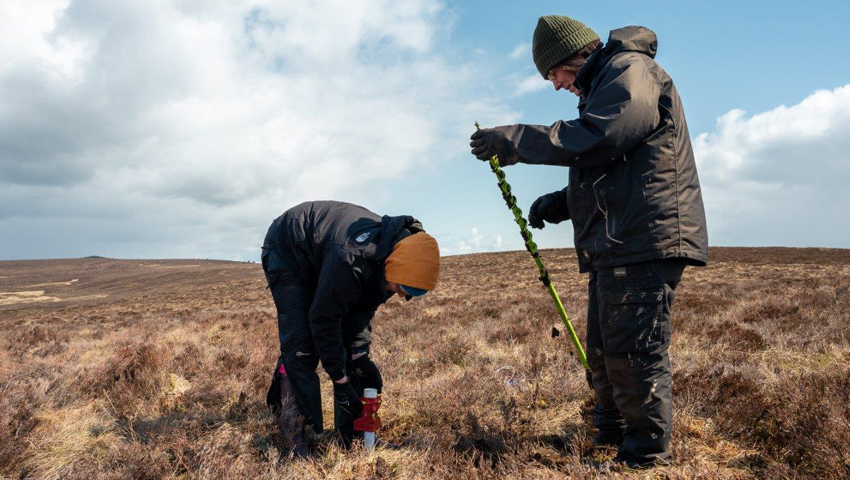Watch our interview with Antonia Boyce from the Climate Innovation Hub
A first of its kind innovation and technology proving ground for climate solutions for the world’s farmers and land managers has been launched at a remote Scottish hill farm.
The Climate Innovation Hub at Glensaugh has been set up in an Aberdeenshire glen by independent research organisation The James Hutton Institute to plug a critical gap in access to real-world farming and land management sites to prove and reduce the risk of new climate friendly technologies and ideas.
Antonia Boyce, Climate Innovation Hub Manager, says, “Reducing emissions in the farming and wider land management sector is a real challenge across Scotland, where agriculture is responsible for about 19% of our emissions and it’s essential that we enable innovation to tackle the problem. But it’s not easy for innovators to test their ideas or collaborate with others working in the same space, so we’re inviting companies or individuals with great ideas they want to test out to get in touch.
“With the Centre for Smart Natural Capital also being hosted here, it will possibly also be the smartest hill farm in the UK. We aim to deploy a growing variety of both mainstream and emerging intelligent wireless communications technologies to support farm and estate-wide remote sensor deployments.”
Through the hub, technology developers will have access to the institute’s 1,000ha research farm, including offices, conference facilities and laboratories, to help them develop and test novel concepts and tools, from new smart sensors to recycling farm waste.
The hub, funded by the Macaulay Development Trust, a charity which supports research into sustainable use of land and natural resources, has already welcomed its first tenant, carbon capture start-up UNDO.
The firm is trialling a technology that aims to both enrich soil and help sequester large volumes of carbon dioxide, by spreading crushed basalt rock onto agricultural land.
In partnership with CENSIS, Scotland’s Innovation Centre for sensing, imaging and Internet of Things, the hub will also be home to another cutting-edge new initiative, the Centre for Smart Natural Capital. This will provide a unique platform for the development of smart sensing, monitoring and advanced computing and analytics needed to inform the growing field of natural capital.
Jez Wardman, agronomist at UNDO, says, “To demonstrate the agronomic co-benefits of enhanced rock weathering, UNDO’s permanent carbon removal technology, we need to collect and process vast amounts of data on soil and crop health. Having the facilities and trial site at the Climate Innovation Hub at Glensaugh gives us the capability to scale our climate technology globally, underpinned by fundamental science and with the support of the Hutton’s experts.”
Franceska van Dijk, Chair, of the MDT says, “Land and nature-based climate stewardship is fundamentally important in the transition to a more sustainable economy. The Macaulay Development Trust is delighted that our investment is already supporting pioneering, practical research at Glensaugh to showcase rural innovation that tackles the climate challenge.”
The Climate Innovation Hub is the latest project to come out of the Hutton’s Climate-Positive Farming Initiative at the Glensaugh research farm. Other projects include HydroGlen, which will see this farming community become energy self-sufficient using renewable energy and green hydrogen. The initiative also includes woodland planting, peatland restoration, natural flood management, managing farmland for multiple benefits and more.
Professor Alison Hester, who leads the Hutton’s Climate-Positive Farming Initiative, says, “The Climate Innovation Hub is an exciting new addition to our growing portfolio of activities within the Climate-Positive Farming Initiative. It will facilitate ground-breaking innovations and we are looking forward to hosting and supporting these new ventures.”
CENSIS’ chief executive Paul Winstanley says, “We are delighted to be working with the James Hutton Institute and the Macaulay Development Trust to support the Centre for Smart Natural Capital in this world class partnership. The natural environment, both wild and managed, has many unmet needs in terms of sensing and data frameworks, and we have in Scotland a serious ecosystem of innovators and developers focused on creating the next generation of sensing and internet-of-things (IoT) technologies. We hope to help nurture some great collaborations.”
Watch our interview with Antonia Boyce from the Climate Innovation Hub
